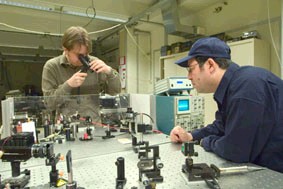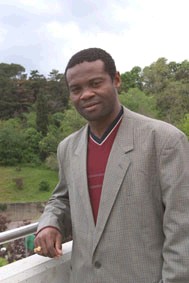Personal tools
News from ICTP 108 - Features - STEP

The IAEA-ICTP 'STEP' programme hopes to stem the chronic brain drain problem that plagues so many nations in the developing world.
STEP by STEP
They grew up in divergent cultures
and live and study in distant countries. Yet they speak a common
language: the language of lasers.
Now, thanks to the IAEA (International Atomic Energy Agency)-ICTP
Sandwich Training Educational Programme (STEP), they have an opportunity
to advance their skills and ultimately earn doctorate degrees
without joining their nation's professional Diaspora and becoming
yet another 'lost' statistic in the developing world's chronic
brain drain problem.
Rosen Kanchev Ivanov hails from Bulgaria, Tetchou Nganso Hugues
Merlain from Cameroon and Gamal Elsayed Mahmoud Afifi from Egypt.
Their paths have briefly crossed in Trieste but at the conclusion
of their three-year educational journeys, each--if all goes according
to plan--will be firmly rooted in their home countries poised
to pursue long and fruitful careers as teachers and researchers.
"That's the goal of the IAEA-ICTP STEP initiative,"
says Ana Maria Cetto, head of the IAEA's Department of Technical
Cooperation (TC), which is the Agency's lead department for seeking
ways to put nuclear research to work in solving some of the developing
world's most pressing health and environmental problems. TC provides
the funds for STEP while ICTP shoulders lead responsibility for
its day-to-day operations.
"We all know that a scientific divide separates the North
from the South and that a major force driving this divide is the
lack of skilled scientific and technical personnel in many developing
countries," says Gallieno Denardo, a long-time scientist
at ICTP, who was instrumental in the development and implementation
of STEP. "Compounding this problem is the fact that so many
of the developing world's most talented scientists are educated
in the North and, once they have an opportunity to live and study
here, they often decide to remain here."
"The programme," notes Paulo Baretto, a recently retired
staff member of IAEA's TC department, who worked closely with
Denardo during the 1990s to put STEP in place, "is based
on the notion that a student who stays at home to earn a degree
will remain at home to live and work. Yet, while we want to encourage
students to stay at home, we do not want to handicap either their
education or career prospects for doing so."
That's where STEP comes into play. Under the programme, students
from developing countries that are member states of IAEA will
be offered fellowships to pursue doctorates in fields of interest
to the Agency that also coincide with ICTP's major fields of study.
These fields include, for example, atomic, laser, nuclear and
plasma physics; mathematical modelling; medical radiation physics;
and nuclear, isotope and synchrotron radiation techniques.
"Each student," says Baretto, "has two advisors
who work closely together to help guide the course of study. The
primary advisory is a professor at the university where the student
is enrolled and where he or she will receive a degree. The second
advisor-an 'external' advisor, if you will-resides at the facility
that the student plans to visit abroad."
"The thesis topic that the student and professors decide
on," continues Baretto, "is based on three interrelated
criteria: it must pose a research challenge for the student, be
of potential value to the student's home country, and explore
questions that are within the scope of ICTP's research and training
activities."
"This strategy" notes Denardo, "not only provides
valuable guidance for the student but also helps to promote collaboration
among the mentoring professors who exchange information about
the student's research and progress and, in the process, learn
more about each other's facilities. We're hoping that the programme
helps build both individual and institutional capacity."
All told, the student spends three to six months a year over three
years at his 'away' institution. The rest of the time is spent
at his or her 'home' institution pursuing traditional studies
in a traditional setting.
The work of Ivanov, Tetchou and Afifi focusses on synchrotron
radiation theory and applications. More specifically, their work
both analyses the theory of harmonic generation and explores experimental
techniques that foster the creation of stable beams from unique
crystals.
"The goal," says Afifi, "is to contain the beam's
oscillation by stabilising the pulse amplitude and timing. In
short, we try to analyse and ultimately reduce the level of 'jitter'
in the light source, a problem that makes it an unreliable tool
for the tasks we will ask it to do." Stable beams, for example,
can be used both to uncover the molecular makeup of materials
and to advance fibre-based digital communication.

Rosen Kanchev Ivanov and Gamal Elsayed Mahmoud Afifi
Ivanov and Afifi's work has brought them to Elettra synchrotron
radiation facility located near Area Science Park some 15 kilometres
from ICTP's Miramare campus. Tetchou's research has taken him
both to ICTP and Universite Catholique de Louvain in Belgium.

Tetchou Nganso Hugues Merlain
"These are not the only facilities that have been made available
to STEP students," says Denardo. "In addition, there
are the International Centre for Genetic Engineering and Biotechnology
(ICGEB) and Laser Laboratory, located in Area Science Park in
Trieste, as well as an increasing number of laboratories and research
centres within the region."
Denardo adds that "ICTP will not only oversee the daily operation
of STEP--in cooperation with IAEA--but will offer its own set
of STEP fellowships in fields that do not fall under the Agency-sponsored
portion of the programme--for example, in mathematics and condensed
matter and elementary particle physics." This will allow
an even broader range of students to benefit from the initiative.
In total, about 25 to 30 fellowships will be offered each year.
"The number," Denardo says, "is not only related
to budget considerations but also due to the fact that we want
students to be in direct contact with their advisors both at home
and abroad. We have discovered that such personal interaction
is one of the most important keys to success." In the programme's
first year, some 100 applications from students in 25 countries
were received.
"From IAEA's perspective, the overall goal of STEP,"
says Cetto, "is to strengthen the scientific capability of
young researchers from developing member states so that they can
contribute to the scientific, technical and economic development
of their home countries. Many of the programmes sponsored by IAEA's
TC department are project-oriented and have specific, clearly
defined objectives. STEP adds an important new dimension to the
Agency's efforts because it seeks to nurture the life-long knowledge
and skills that young researchers will need to address critical
science-based problems throughout their careers."
In a sense, STEP is designed to help address science-related development
problems among member states by creating a pool of well-trained
scientists and technologists who can address a wide range of challenges
and ultimately help to educate and train subsequent generations
of researchers at home. "It is based," Denardo notes,
"on the enduring concept that you can never take knowledge
away from someone."
IAEA would like to extend STEP through cooperative arrangements
with institutions other than ICTP, but Cetto acknowledges that
it will take some time and careful planning before moving ahead.
"ICTP," she says, "is a unique institution that
has enjoyed decades of experience in the training of young scientists
from the developing world. There are few institutions that can
match the Centre's track record of success."
"Our long-standing relationship with ICTP is what drew us
to this partnership in the first place and the early indications
are that our confidence in the Centre has been well placed. STEP
is off to a good start and we expect its impact to grow in the
years ahead."Æ
For additional information about the IAEA/ICTP Sandwich
Training Educational Programme (STEP), contact ICTP, Office of
External Activities, Enrico Fermi Building, Via Beirut 6, 34014
Trieste, Italy; phone: +39 040 2240 322; fax: +39 040 2240 443;
email: calligar@ictp.trieste.it;
web: http://www.ictp.it/www_users/STEP/STEP.html.
The deadline for the next round of applications is 15 September
2004.